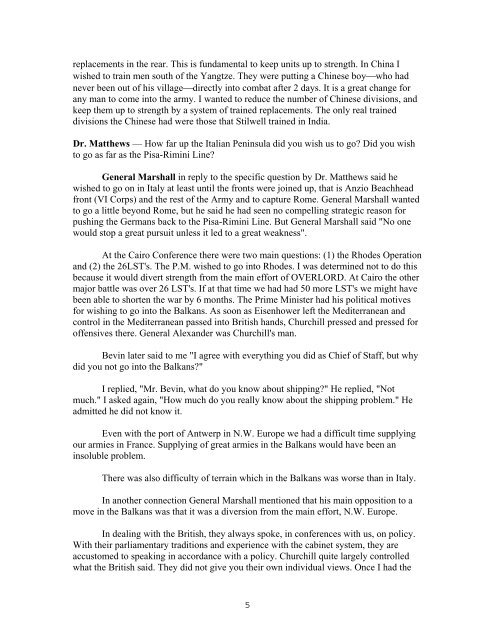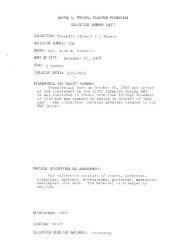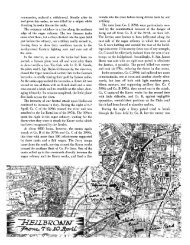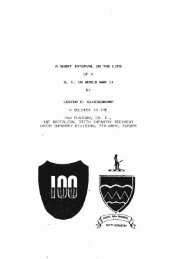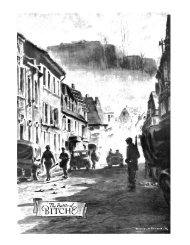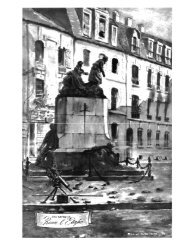July 25, 1949 - The George C. Marshall Foundation
July 25, 1949 - The George C. Marshall Foundation
July 25, 1949 - The George C. Marshall Foundation
Create successful ePaper yourself
Turn your PDF publications into a flip-book with our unique Google optimized e-Paper software.
eplacements in the rear. This is fundamental to keep units up to strength. In China I<br />
wished to train men south of the Yangtze. <strong>The</strong>y were putting a Chinese boy⎯who had<br />
never been out of his village⎯directly into combat after 2 days. It is a great change for<br />
any man to come into the army. I wanted to reduce the number of Chinese divisions, and<br />
keep them up to strength by a system of trained replacements. <strong>The</strong> only real trained<br />
divisions the Chinese had were those that Stilwell trained in India.<br />
Dr. Matthews — How far up the Italian Peninsula did you wish us to go? Did you wish<br />
to go as far as the Pisa-Rimini Line?<br />
General <strong>Marshall</strong> in reply to the specific question by Dr. Matthews said he<br />
wished to go on in Italy at least until the fronts were joined up, that is Anzio Beachhead<br />
front (VI Corps) and the rest of the Army and to capture Rome. General <strong>Marshall</strong> wanted<br />
to go a little beyond Rome, but he said he had seen no compelling strategic reason for<br />
pushing the Germans back to the Pisa-Rimini Line. But General <strong>Marshall</strong> said "No one<br />
would stop a great pursuit unless it led to a great weakness".<br />
At the Cairo Conference there were two main questions: (1) the Rhodes Operation<br />
and (2) the 26LST's. <strong>The</strong> P.M. wished to go into Rhodes. I was determined not to do this<br />
because it would divert strength from the main effort of OVERLORD. At Cairo the other<br />
major battle was over 26 LST's. If at that time we had had 50 more LST's we might have<br />
been able to shorten the war by 6 months. <strong>The</strong> Prime Minister had his political motives<br />
for wishing to go into the Balkans. As soon as Eisenhower left the Mediterranean and<br />
control in the Mediterranean passed into British hands, Churchill pressed and pressed for<br />
offensives there. General Alexander was Churchill's man.<br />
Bevin later said to me "I agree with everything you did as Chief of Staff, but why<br />
did you not go into the Balkans?"<br />
I replied, "Mr. Bevin, what do you know about shipping?" He replied, "Not<br />
much." I asked again, "How much do you really know about the shipping problem." He<br />
admitted he did not know it.<br />
Even with the port of Antwerp in N.W. Europe we had a difficult time supplying<br />
our armies in France. Supplying of great armies in the Balkans would have been an<br />
insoluble problem.<br />
<strong>The</strong>re was also difficulty of terrain which in the Balkans was worse than in Italy.<br />
In another connection General <strong>Marshall</strong> mentioned that his main opposition to a<br />
move in the Balkans was that it was a diversion from the main effort, N.W. Europe.<br />
In dealing with the British, they always spoke, in conferences with us, on policy.<br />
With their parliamentary traditions and experience with the cabinet system, they are<br />
accustomed to speaking in accordance with a policy. Churchill quite largely controlled<br />
what the British said. <strong>The</strong>y did not give you their own individual views. Once I had the<br />
5


